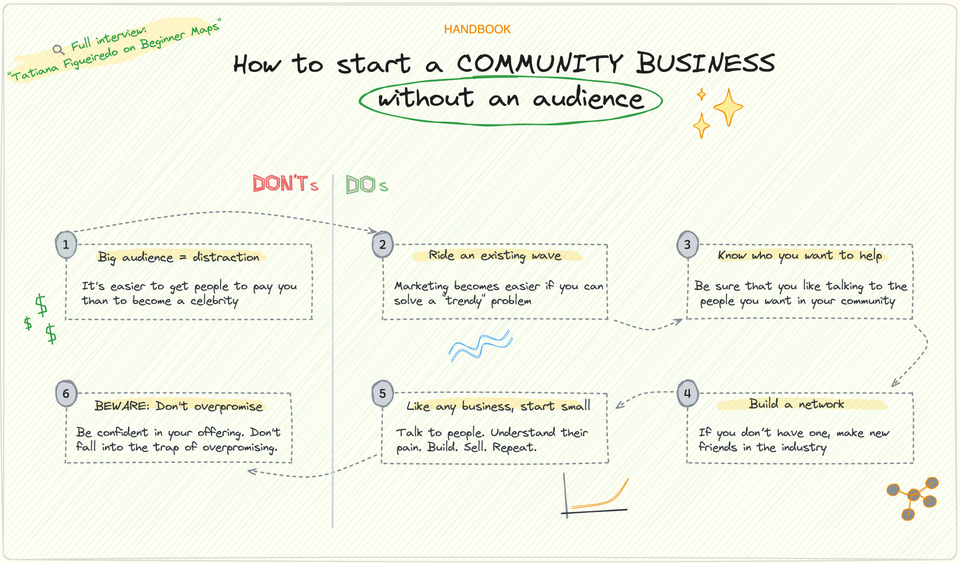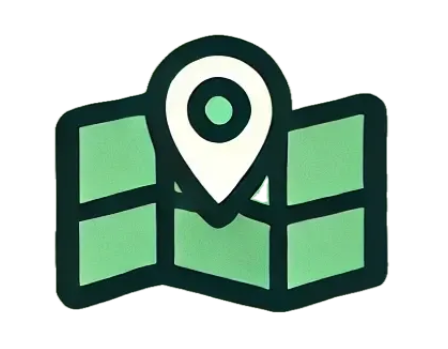How to start a community business without an audience
You don't have to be a big celebrity to run a business that works. This article shares Tatiana's recipe on how to start a community business without an audience.

“I don’t think you have to be a big celebrity to run a business that works.”
– Tatiana Figueiredo
Tatiana started with 50 people on her email list and 1 year later she had made $100k+ with her cohort-based course about building online community businesses.
We made $100K+ in the first year of running a course and community.
— Tatiana Figueiredo ✨ (@tatfig) September 6, 2022
I started from scratch: <100 email subscribers, no content built, no targeted audience on social media and no ads.
Here are 8 ideas to consider if you're starting an online business from scratch...
Good thing that she’s an expert on community building. In fact, today this above mentioned business has turned into Business of Community - an online school and community that helps founders create profitable community businesses. So, I was able to sit down with her and ask her questions for you.
In this 3-min read, I distill everything that she shared on that interview that will help you start a community.
Her #1 contrarian insight? Having a big audience is a distraction.
When you are building a business, you need customers, not an audience. Think - what's like the, the straightest line to your first few customers? And how can you get there faster than you think?
It's easier to get someone to pay you than it is to become a celebrity. You just need the first few people to give you money for the thing you’re doing.
And let your customers inform whatever the next step is instead of deferring it to this future where you have a million followers or where you have a viral video.
Tip #2: It helps if you can ride an existing wave
Tatiana started her course in 2021 when building online communities was the hot thing to do. People were sitting at home during the lockdowns and there was a heavy need for belonging. Her course taught people how to build a business while solving for belonging.
“Even though I didn't have like a huge audience, I wasn't showing up a ton online and I was still getting people referred to me. I was still getting more clients than I could work with.”
So, if you are in the idea-stage, look at the current trends and see if you can build something useful around one of them.
Tip #3: Talking about the idea stage, do you know who you want to help?
People often make one foundational mistake that ruins their prospects of building a business - thinking about idea and not people. They think of a topic to start a community around and just start.
This is hard because you may end up realising that you aren’t even interested in talking to these people.
So before you start a community, you need to have a clear idea of the people you want to help. Do you want to spend your time talking to them, listening to their struggles and trying to solve them?
Maybe you work a full-time job and you see a group of poeple who need a particular type of help. Or maybe you are already helping people 1-on-1 and the community is the next step - like it was for Tatiana. She was already helping people in a consulting capacity when she realised that the demand was more than what she could handle.
Tip #4: You may not need an audience but you do need a network
Before starting this business, Tatiana took a cohort-based course on.. how to build a cohort-based course. That’s right! Through this course she built a small network of people who sent her people who sent referrals to her in the early days, retweeted her tweets and supported her in general.
She also partnered with relevant companies - Circle ($25M series A) and Heartbeat ($1M seed) - both of which provide software platforms for building an online community. These businesses started around the same time as Tatiana’s. So she forged a relationship with the founders, became a listed as an “Expert” on their websites and led workshops for their customers.
Lesson? Your network is the key. If you don’t have one, build it. Make new friends in the industry you want to serve.
Tip #5: Start it like any new business
- Once you know who you want to serve, you need to talk to them. Book calls with 5 people. This is not a sales call. This is just an interview to understand if these people really face the problem you’re trying to solve. Do they bring it up on their own?
- After this call, maybe you find out that 4 out of these 5 people face the problem you’re trying to solve. Now, launch a low-stakes beta for them like a workshop. Charge a small amount of money from them (important) and test your content. This will give you confidence in the content and give you testimonials that you can use for the next stage.
- If you were able to solve a problem for them, you should be able to go to the next stage. They should become more interested in what you are doing. So host another workshop with different content and try to get more people to it.
This is how you can gradually build your offering, stage by stage. If you’re doing it right, at each stage, you’ll build a relationship and have an honest sales conversation with the customers. Don’t pretend to be going through some kind of process, but what you're actually want is to extract value from them.
Tatiana explains it best in this 5-min clip:
Tip #6: Don’t overpromise and underdeliver
Tatiana says that, “Community builders tend to be very people pleasing”. We tend to think how can I give away more and more and more to give people their money’s worth. Especially at the beginning.
Here’s a counterintuitive advice - do less. People are busy and the more you try to overwhelm them with extra things, the less interested they will be in engaging in your community.
So, here’s how to think instead:
What are the minimum set of actions they need to do, minimum interactions that they need to make in the community, to achieve their goal. If you pick these important things and leave out everything else, you’re doing them a favour.
In order to do this, you need to have confidence in what you’re charging. That’s why it’s crucial that you start with a small group where you can handhold them to get them where they want to be. Then, think about scaling that experience with confidence.
You can check out Tatiana’s full-interview here.

